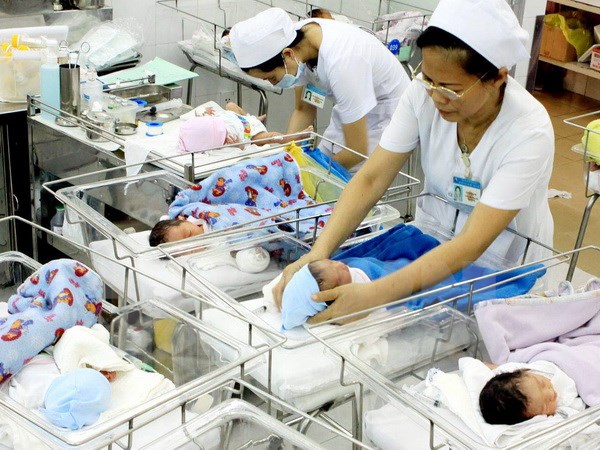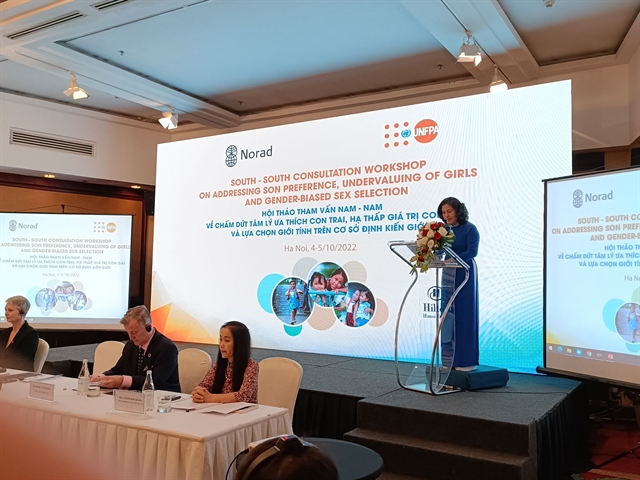 Society
Society


|
| Việt Nam has had a very good track record in dealing with son preference and gender-biased sex selection over the past 15 years. — VNS Photo Dương Ngọc |
HÀ NỘI – Việt Nam is continuing to improve the legal framework to enhance gender equality and eliminate the stereotype of son preference, undervaluing of girls and gender-biased sex selection for the country’s sustainable development, the Ministry of Labour, Invalids and Social Affairs has said.
Speaking at a workshop held on Tuesday, Nguyễn Thị Hà, vice minister of Labour, Invalids and Social Affairs, said Việt Nam always considered gender equality a goal and a driving force for the country’s sustainable development.
Việt Nam had made great progress in gender equality over the past decade. However, sex selection on the basis of gender stereotypes continued to persist in society.
This practice had been identified as the main cause of the imbalance in the sex ratio at birth in Việt Nam.
According to the Population and Housing Census, the sex ratio at birth in 2021 was 112 boys per 100 girls. The rate without any human intervention is 105 boys per 100 girls.
It is forecast that by 2034, Việt Nam will have an excess of 1.5 million men aged 15-49 and the number will reach 2.5 million by 2059.
"Bringing the sex ratio at birth to the natural rate is one of the goals of the National Strategy on Gender Equality for the 2021-2030 period," she said.

|
| Nguyễn Thị Hà, vice minister of Labour, Invalids and Social Affairs delivers a speech at the two-day workshop on son preference, undervaluing of girls and gender-biased sex selection in Hà Nội. VNS Photo Khánh Linh |
According to Bjorn Andersson, UNFPA Regional Director, there is a shortage of approximately 140 million women around the world due to son preference and gender-based sex selection, which is a common form of sexism.
The increase in sex selection is alarming because it reflects a persistent underestimation of the status of women and girls. The result is a gender imbalance that also has harmful effects on society such as increasing prevalence of sexual violence and human trafficking.
“We need to understand clearly that son preference and gender selection are primarily the issue of gender inequality and violations of women's human rights. Girls and women are constantly underrated. And they continue to face discrimination, which again puts their roles and potential undervalued. Even many families choose not to have girls and choose sex on the basis of gender identity to ensure there is a son in the family,” he said.
“UNFPA once again calls for attention and accelerates efforts to develop policies and programmes aimed at ending all forms of discrimination on the basis of gender, including son preference and gender-biased sex selection.”
Andersson said UNFPA was the only UN agency working on all three harmful practices, including child marriage, female genital mutilation and son preference. It recognised these harmful practices as manifestations of patriarchal ideology, gender inequality and discrimination.
UNFPA has been at the forefront of efforts to eliminate gender-based sex selection practices in Asia since 1994.
In 2016, UNFPA received a financial contribution from the European Union to support the global programme to stop son preference and gender-based sex selection in order to build and strengthen evidence-based national strategies, policies and programmes to address the issue.
The programme was conducted in six countries in Asia and the Caucasus, including Nepal, Bangladesh and Việt Nam. UNFPA, in cooperation with the Government of Norway, has implemented the second phase of the programme in the 2020-2022 period, focusing on Bangladesh, Nepal and Việt Nam.
Việt Nam has had a very good track record in dealing with son preference and gender-biased sex selection over the past 15 years, making Việt Nam a model country of good practice for the sake of south-south co-operation, a form of cooperation that promotes effective development through learning and sharing of experiences, practices and technologies among developing countries.
Naomi Kitahara, UNFPA Country representative, said she was happy to witness a movement by establishing legal and policy frameworks, introducing innovative and youthful media activities geared toward behavior change, and providing integrated services.
“It is important that we stay on track, so that we can begin to deliver and fully refine to ensure maximum impact of joint interventions throughout the years,” she said.
The workshop, hosted by Việt Nam, would create a path for inter-country dialogue about what had been done, what had not been done, and outline the necessary actions in the future to bridge the gap and work together to truly promote gender equality in the region and around the world, she said.
The two-day workshop, jointly organised by UNFPA and Norad, gathered representatives from Armenia, Azerbaijan, China, Bangladesh, India, Nepal, and Georgia sharing action plans to prevent the sex ratio imbalance at birth, thereby contributing to strengthening cross-border cooperation in promoting gender equality and gender rights. – VNS